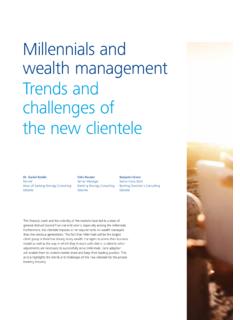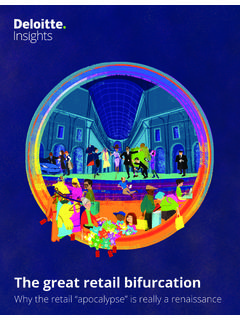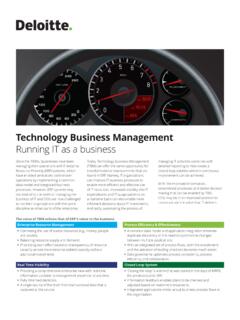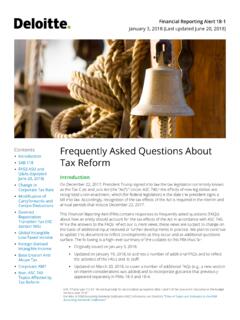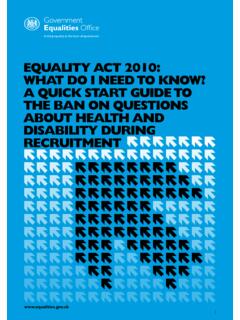Transcription of Mental health and employers Refreshing the case for …
1 Mental health and employersRefreshing the case for investmentJanuary 2020 Contents01 Foreword by Deloitte03 Foreword by Mind04 Introduction06 Definitions091. What is the cost of poor Mental health at work ?172. What has changed since 2017?253. Why should employers invest in Mental health interventions?294. What else can employers do?37 Appendix 2: Costing methodology35 Appendix 1: Mental health in the workplace: An employee journey40 Appendix 3: ROI methodology42 Appendix 4: ROI Employer case studies44 Appendix 5: Mental health at work standards checklist46 Appendix 6.
2 ROI report summary 53 Endnotes56 Contacts55 AuthorsForewordRebecca George OBEVice Chair and UK Public Sector LeaderDeloitteWith a sixth of workers experiencing a Mental health problem at any one time1 and stress, anxiety and depression thought to be responsible for almost half of working days lost in Britain due to health issues,2 the relationship between Mental health and the workplace is a complex also contributes to presenteeism , where people work when they are not at their most productive, and the newer trend of leaveism where employees feel they must work outside of their normal working research helps us understand more about Mental health and wellbeing in today s labour market, looking at the sectors, industries and regions where there appears to be a greater incidence of Mental health related absences, and reviewing the types of help on offer and their effectiveness.
3 It also looks at the greater prevalence of Mental health problems among younger people and at how the pervasive use of technology can make it more difficult to disconnect from fundamental changes and a sharp increase in costs, to employees and employers , are clear signs that decisive action must be taken now. To this end, we welcome wider discussions on how we can work together to prevent further 2017 we published research3 that contributed to the independent Stevenson Farmer Review4 commissioned by the Government. This supported the national debate on the impact of poor Mental health , quantifying its cost to UK employers and exploring the benefits to employers of providing help at years later, we have updated this analysis to look again at the costs of poor Mental health to UK employers , finding they have increased by 16%,5 now costing up to 45 billion.
4 Our updated work also makes a positive case for investment in Mental health by employers , finding an average return of 5 for every 1 spent, up from the 4 to 1 return identified in 2017, there have been positive changes affecting workplace Mental health . These include a shift, among large employers in particular, towards talking more openly about Mental health at work and providing greater support to , changes in working practices have presented additional challenges to maintaining good Mental health . For example, while there are substantial benefits from the increased use of technology in the workplace, an always on culture can have a detrimental effect on employee report looks again at the costs to employers of poor Mental health , and finds that they have increased by 16%, costing up to 45 billion.
5 01 Mental health and employers | Refreshing the case for investmentForewordAs our ways of working evolve, so do expectations of how employers should support their people, and employers will also need help with this. Alongside ongoing work to provide help, reduce stigma and create an open culture around Mental health , employers will also need to get to grips with newer challenges, such as a rise in leaveism, enabled by will be important to bring together different stakeholders to lead further work on this issue and Government, with its ability to facilitate such discussions and as a major employer in its own right, is well placed to drive this.
6 Building on the Thriving at work recommendations, this will require an honest appraisal of employers attitudes to poor Mental health , the help that is available, and how best practice can be embedded in organisations of all sizes across the new Government policy is developed, its impact on Mental health should be considered. For example, flexible working and financial education are covered in this report for both, a joined up approach to developing and implementing Government policy is we have done over the last few years at Deloitte to create an open and inclusive culture includes providing training and advice to help our people spot the signs of Mental ill health and how to reach out to those who may need support.
7 In addition, many of our people have shared stories about their Mental health to make clear that doing so will not have a detrimental effect on a person s career and we offer independently provided counselling and advice to those who need common with our peers across the UK, we still have much further to go. Through our membership of the City Mental health Alliance and by signing up to the Mental health at work Commitment, we continue to collaborate with other likeminded organisations across the UK to support the sharing of insight, and encourage other employers do the same.
8 We will continue to highlight long standing and emerging issues relating to workplace Mental health and hope others find our contribution on the Thriving at work recommendations, this will require an honest appraisal of employers attitudes to poor Mental health , the help that is available, and how best practice can be embedded in organisations of all sizes across the UK. 02 Mental health and employers | Refreshing the case for investmentForewordPaul Farmer CBEC hief Executive OfficerMindOctober 2019 marked the second anniversary of the Thriving at work review, an independent review of Mental health at work commissioned by the Government and led by Lord Dennis Stevenson and myself, and it is a good opportunity now to remind ourselves of the vision that was set out.
9 When setting out this vision we realised the scale of the task ahead, and this review of the case for investment is a stark reminder that this is an issue that cannot be the past two years we have seen a number of organisations start to prioritise the Mental health and wellbeing of their staff, whether by signing up to anti stigma initiatives such as the Time to Change employers Pledge, providing training for staff, introducing wellbeing champions or signing up to Mind s Workplace Wellbeing Index. All of these measures are helping employers meet the Mental health standards that were set out in the Thriving at work national Thriving at work Leadership Council was set up, and for the first time senior leaders from across the private, public and voluntary sectors along with leading industry bodies and Government representatives are coming together to tackle this issue, most recently launching the new Mental health at work this progress, the reality for many employees is that they still don t feel able to talk about their Mental health .
10 A recent Business in the Community 2019 Mental health at work report found that only 49% of employees felt comfortable talking to their line manager about their Mental health , and 39% of employees surveyed said that work had affected their Mental health over the past 12 is still much work to be done and we know that good work isn t just the responsibility of employers is a clear role for Government to increase the standards expected of employers . Change needs to come from Government to ensure that people with Mental health problems are supported in work and have access to rights and protections.
